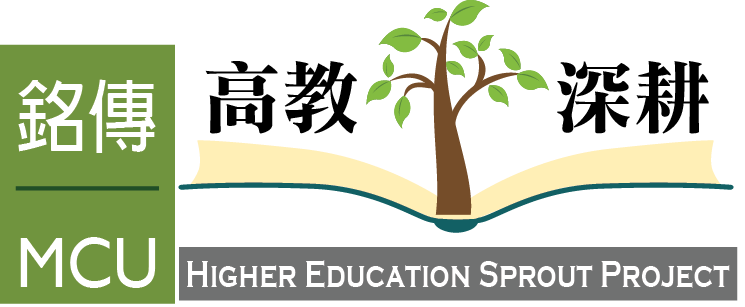1. Origin of the Plan
To implement the vision of “Rooted in Taiwan, Serving the Community,” the university integrates the value of “Giving back to society” into its governance. By adopting a human-centered approach, the university starts with local needs, leveraging cultural care and addressing regional industrial, social, and environmental issues. The goal is to become a university that significantly contributes to the region. By extending Ming Chuan’s “Major Figures” digital core competencies into the community, the university encourages faculty to conduct teaching practice research and integrate USR (University Social Responsibility) issues into professional courses, expanding the influence of knowledge both domestically and internationally.
In recent years, in addition to innovative research in specialized fields, the university has also adopted flipped and interdisciplinary learning approaches, connecting academia to social contexts. Through curriculum enhancement and talent cultivation, it has established long-term ties with community development, nurturing talents to meet future needs and national priorities. Social engagement activities aim to cultivate the following key competencies in students:
- Information Technology and Cultural Care Competence: Utilize technological skills learned to become modern citizens who promote harmony among society, humanity, and nature.
- Problem-Solving Skills: Develop the ability to address challenges through independent and responsible learning activities.
- Social Engagement Skills: Strengthen social responsibility and civic awareness, fostering altruistic world citizens.
2. Objectives and Vision
The university integrates professional knowledge from its schools and departments to address issues in Shilin, Guishan, and Kinmen, the regions where its campuses are located. It identifies local industrial and environmental challenges, focusing on ecological conservation, social equity, local industries, big data and digital learning, cultural heritage, community resilience, and sustainable development as core areas for USR implementation.
Services extend across Taiwan, including outlying islands. Faculty and students actively engage with local communities, linking school, local, public sector, and industrial resources. Efforts range from rural education and cultural innovation to ecological technology and green agriculture value-added industries, aiming to resolve local problems and deepen social responsibility.
Aligned with the university’s development plan, the initiative connects with the “Major Figures” program, emphasizing local characteristics and extending the Ministry of Education’s 108 Curriculum Guidelines and core competencies. It also supports Taiwan’s “2050 Net-Zero Emissions Pathway” and its lifestyle transformation strategy. The plan sets three overarching goals for social responsibility and the second-phase project focus:
- Promoting Professional Social Responsibility through Co-learning: Encourage interdisciplinary courses in social participation that are problem-oriented, fostering consensus and collaboration with community residents and partners. By integrating interdepartmental courses and facilitating cross-disciplinary teaching, the initiative promotes professional exchanges, horizontal communication, and student mobility, improving curriculum planning and activity design.
- Nurturing Adaptive Talents and Building Smart Knowledge Collaboratives: Cultivate talents balancing social sustainability and technological innovation, integrating smart technology, cultural values, entrepreneurship, and environmental education into local practices. Activities such as “learning by doing” foster problem-solving abilities, while USR-designed initiatives enhance students’ social responsibility, civic awareness, and altruistic behavior.
- Advancing Lifestyle Transformation with Circular Green Development: Advocate for “Three Greens and Two Supports” (3G2S) strategies, promoting green agriculture, green consumption, and green tourism while supporting regional revitalization and diverse cultural entrepreneurship. Lifestyle transformation efforts cover all aspects of living, fostering social friendliness, resource recycling, and environmental action, while empowering regional talent and realizing a vision of improved living standards.
Through multi-campus professional contributions, interdisciplinary collaborations, and partnerships with regional industries, the university employs a “Triple Empowerment” mechanism with diverse teaching modes and practical platforms to establish itself as a leader in regional social responsibility.
3. Framework of the Plan
To implement social responsibility, the university is advancing towards the goals of “Three Greens, Two Supports, and One Co-learning,” leveraging the “Triple Empowerment” mechanism. The plan emphasizes four key strategies:
- Developing smart knowledge collaborations in communities.
- Deepening green environmental and cultural efforts.
- Supporting regional economic development.
- Enhancing co-learning in rural and island areas.
The initiative includes building interactive platforms, creating training bases, drafting operational plans, and establishing experimental farms. By utilizing problem-based innovative teaching methods, the university introduces micro-credit courses and interdisciplinary programs, enabling students to engage in service learning and hands-on experiences. These activities showcase students’ energy in digital learning and peer mentorship programs, addressing local industrial challenges, fostering development and innovation, and creating sustainable growth.
Annually, the university produces the “Ming Chuan University Social Responsibility Report” to showcase the project’s outcomes to the public.

